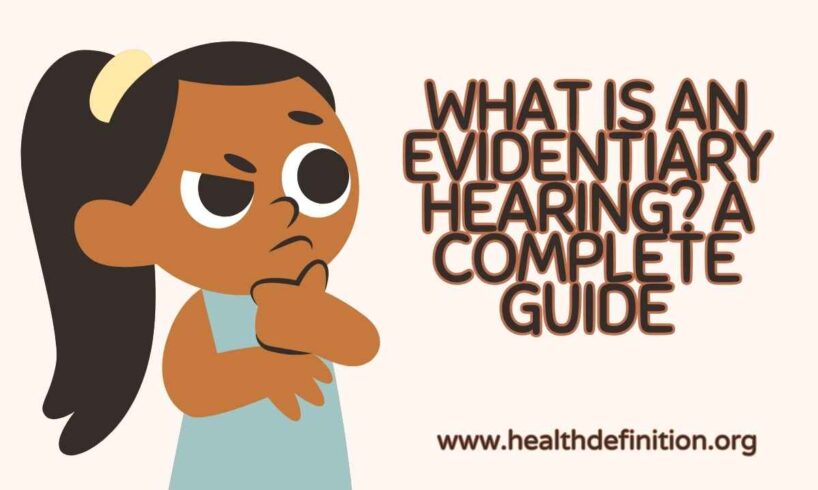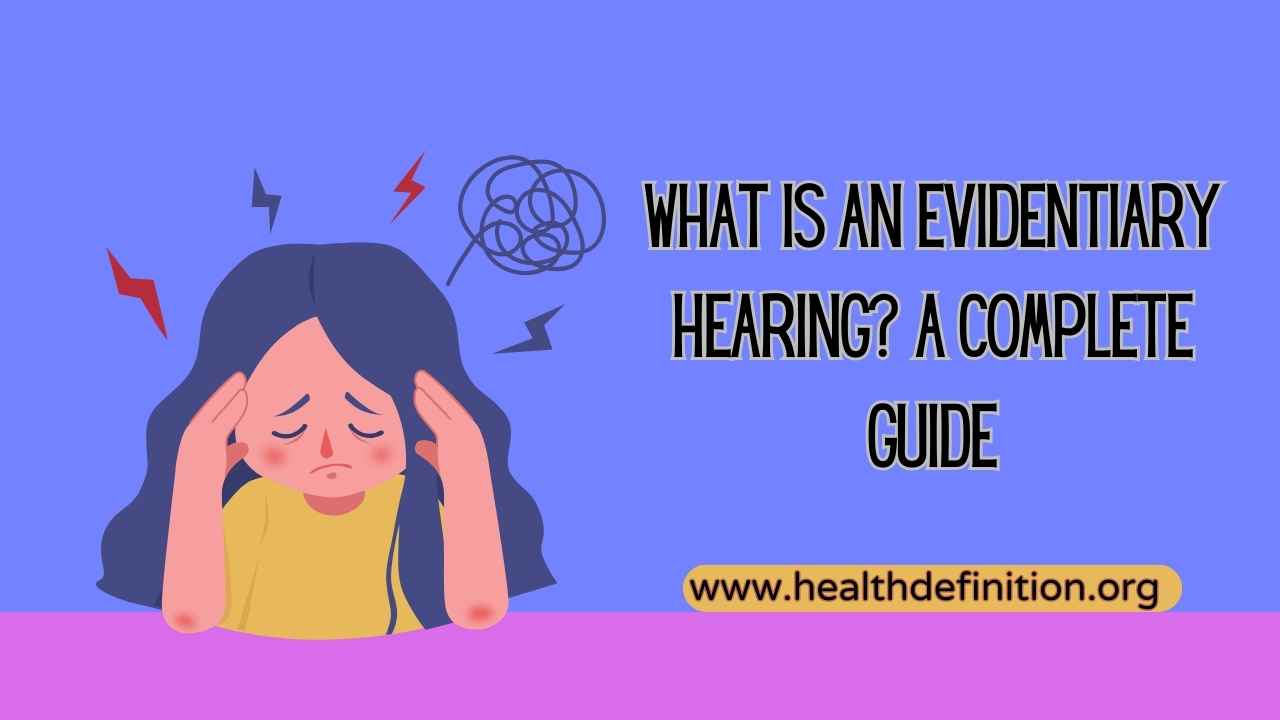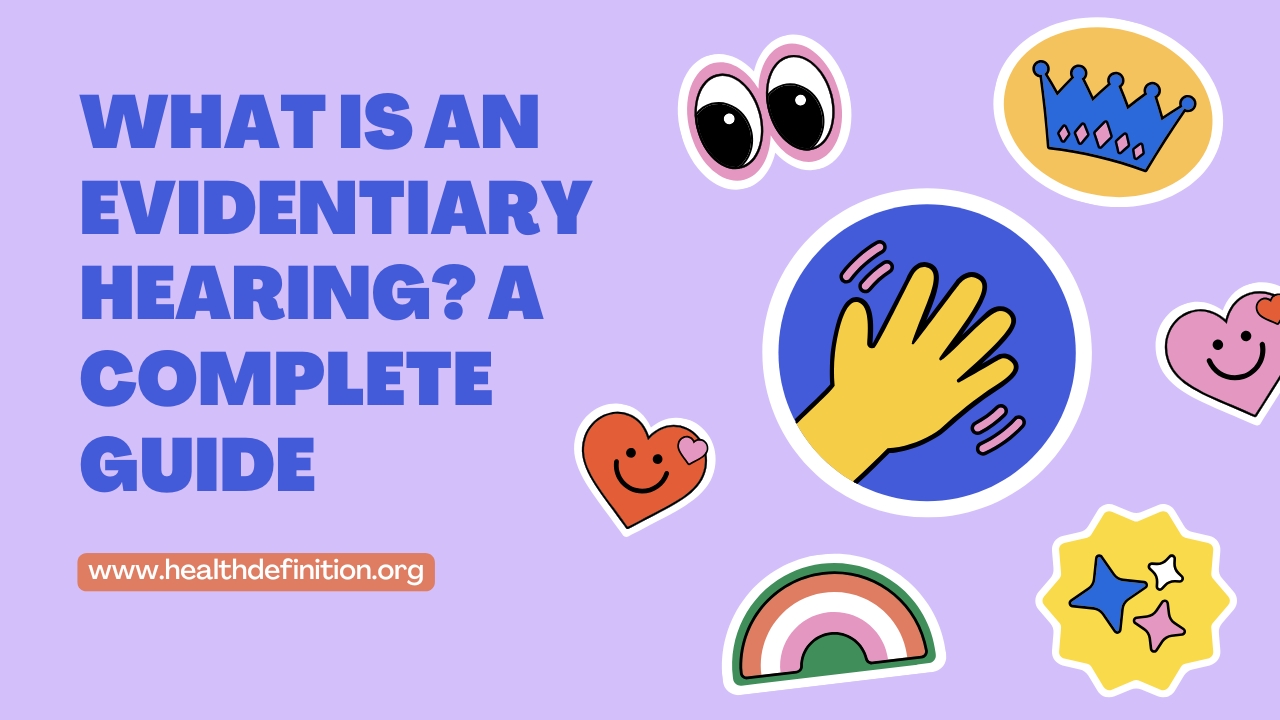
When facing a legal matter involving family law, criminal defense, or civil litigation, you may come across the term “evidentiary hearing.” While it might sound complex, understanding what this hearing entails can significantly impact how you prepare for your case.
In this article, we’ll break down what an evidentiary hearing is, how it works, why it’s important, and what you can expect if you’re ever involved. Whether you’re a litigant, legal enthusiast, or simply looking for reliable legal information, this guide is tailored to give you a comprehensive, jargon-free understanding.
What Is an Evidentiary Hearing?
An evidentiary hearing is a legal proceeding held before a judge, during which both parties present evidence and witness testimony to support their arguments on a specific issue. It is not a full trial, but rather a focused hearing that resolves particular factual or legal disputes before a trial begins or instead of a trial altogether.
These hearings play a crucial role in determining the admissibility of evidence, clarifying the facts of the case, and helping the judge make informed decisions on key pre-trial motions or temporary orders.
Why Are Evidentiary Hearings Important?
Evidentiary hearings serve several purposes in the legal process:
-
Clarifying disputed facts: If there’s conflicting information, the judge may require a hearing to sort out the truth.
-
Ruling on admissibility: These hearings often determine whether certain evidence (like documents, recordings, or testimony) is legally admissible at trial.
-
Establishing temporary orders: In family court, for instance, these hearings can be used to determine child custody, visitation, or support arrangements before a full trial.
-
Protecting legal rights: They allow both parties to present arguments and counterarguments in a structured setting.

Common Scenarios That Call for an Evidentiary Hearing
Evidentiary hearings can happen in many areas of law, but some of the most common scenarios include:
1. Family Law Cases
In family law, especially in child custody or divorce matters, courts often hold evidentiary hearings to decide temporary or permanent issues. Examples include:
-
Custody modifications
-
Allegations of abuse or neglect
-
Determining alimony or spousal support
2. Criminal Law
In criminal proceedings, evidentiary hearings may be used to decide:
-
Whether a confession was made voluntarily
-
If a search and seizure were legal under the Fourth Amendment
-
If a defendant’s rights were violated
3. Civil Litigation
Evidentiary hearings in civil lawsuits might be held to:
-
Decide on preliminary injunctions
-
Examine evidence in business disputes
-
Resolve landlord-tenant conflicts
What Happens During an Evidentiary Hearing?
The structure of an evidentiary hearing can vary depending on the court and the issue at hand, but most follow a standard format:
Opening Statements (Optional)
While not always required, attorneys may begin with a short statement summarizing their position and what they intend to prove.
Presentation of Evidence
This is the core of the hearing. Parties can:
-
Introduce documents, photographs, and other tangible items
-
Call witnesses to testify under oath
-
Cross-examine the opposing party’s witnesses
Judge’s Ruling
After both sides have presented their evidence, the judge will typically issue a ruling either immediately or within a few days. This ruling may affect how the case proceeds or resolve the matter entirely.

How to Prepare for an Evidentiary Hearing
Preparation is key. Here are a few tips to ensure you’re ready:
1. Gather and Organize Evidence
Collect all relevant documents, records, and other supporting materials. Make copies for the court and the other party.
2. Identify and Prep Witnesses
If witnesses are essential to your case, ensure they are available and understand what to expect. Practice questions and prepare them for cross-examination.
3. Work With Your Attorney
If you have legal representation, meet with your lawyer to develop a strategy, discuss key arguments, and plan how to handle potential challenges from the opposing party.
4. Understand the Law
Knowing the legal standards relevant to your issue can help you better frame your evidence and arguments. Your attorney can explain what the judge is likely to consider when making a decision.
What Happens After an Evidentiary Hearing?
Once the hearing concludes, several outcomes are possible:
-
The judge issues an immediate ruling from the bench.
-
The judge takes the matter under advisement and issues a written ruling later.
-
The case proceeds to trial if the hearing was just a preliminary step.
Regardless of the outcome, the evidence presented at the hearing becomes part of the official court record and may influence future decisions in your case.
Can You Appeal a Decision From an Evidentiary Hearing?
Yes, in some cases. If the ruling from the hearing significantly affects the outcome of your case, and you believe it was made in error, you may have grounds for an appeal. However, appeals must usually be based on legal errors or procedural mistakes, not simply because you disagree with the result.
Consulting with an appellate attorney is the best way to assess your options.
A vindicatory hearing is a formal legal proceeding where the primary objective is to determine the admissibility, relevance, and weight of specific pieces of evidence before or during a trial. Unlike the trial itself, which focuses on establishing guilt or liability, a vindicatory hearing serves as a preliminary or procedural step, ensuring that the evidence meets legal standards and does not infringe on the rights of any party involved.
Typically overseen by a judge, this hearing may involve testimony, cross-examination, and legal arguments from both sides, but its scope remains narrowly focused on evidentiary issues such as authenticity, chain of custody, or constitutional concerns like unlawful search and seizure. The outcome of a vindicatory hearing can significantly influence the direction of a case, as the inclusion or exclusion of critical evidence can strengthen or weaken a party’s position.
Final Thoughts
An evidentiary hearing may seem intimidating, especially if you’ve never been in court before. But with proper preparation and a clear understanding of the process, you can navigate it successfully. These hearings are essential tools for resolving disputes, ensuring fairness, and making sure the court hears all sides of the story.
Whether you’re involved in a family dispute, a civil lawsuit, or a criminal defense matter, knowing what to expect in an evidentiary hearing empowers you to protect your rights and present your case effectively.

FAQ About Evidentiary Hearings
What is the purpose of an evidentiary hearing?
An evidentiary hearing allows a judge to evaluate and rule on specific issues in a case by reviewing evidence and hearing witness testimony. It’s often used to settle disputes before trial or to decide on temporary orders.
Is an evidentiary hearing the same as a trial?
No, an evidentiary hearing is not a full trial. It’s a focused hearing on particular issues or motions within a case. While it involves presenting evidence and witnesses, it usually covers a narrower scope than a full trial.
What kind of evidence is allowed in an evidentiary hearing?
Evidence may include documents, emails, photographs, video or audio recordings, expert testimony, and personal witness statements. The judge decides what is admissible based on relevance and legal rules of evidence.
Can I represent myself at an evidentiary hearing?
Yes, but it’s highly recommended to have legal representation. Evidentiary hearings involve complex legal standards and rules of procedure, so having a lawyer can improve your chances of a favorable outcome.
How long does an evidentiary hearing last?
The length varies depending on the issue and complexity of the case. Some hearings may last less than an hour, while others can take several hours or even multiple days.
Will the judge make a decision right away?
Sometimes. Judges may issue a ruling immediately after the hearing or take time to review the evidence and issue a written decision within a few days or weeks.
What happens if I miss an evidentiary hearing?
Missing an evidentiary hearing can have serious consequences, including default rulings or loss of the opportunity to present your side. If you cannot attend, notify the court in advance and request a continuance.
Can new evidence be presented at an evidentiary hearing?
Yes. An evidentiary hearing is specifically designed for the presentation of new or disputed evidence. Each side may introduce evidence and call witnesses relevant to the matter being decided.
Are evidentiary hearings open to the public?
Most evidentiary hearings are open to the public unless they involve sensitive matters (e.g., child custody, juvenile cases) where the court may limit access to protect privacy.
Can I appeal the outcome of an evidentiary hearing?
In some cases, yes. If the judge’s decision affects a significant aspect of your case and there are legal or procedural errors, you may have the right to appeal. It’s best to consult with an appellate attorney to explore your options.
Bullet points about evidentiary hearings
-
Unlike a full trial, an evidentiary hearing targets narrow issues like custody, evidence admissibility, or pretrial motions.
-
Common in family law, criminal defense, and civil litigation, these hearings often influence major case outcomes.
-
Judges may issue rulings immediately or after reviewing all presented materials.
-
Proper preparation, including organizing evidence and preparing witnesses, is crucial for success.
-
Missing an evidentiary hearing can lead to unfavorable rulings or waived rights.
-
While self-representation is allowed, legal counsel is strongly advised due to the procedural complexity.






